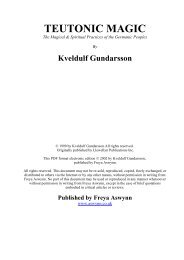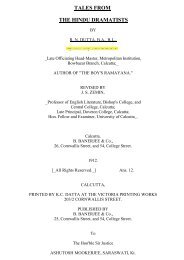Untitled - Awaken Video
Untitled - Awaken Video
Untitled - Awaken Video
Create successful ePaper yourself
Turn your PDF publications into a flip-book with our unique Google optimized e-Paper software.
Chapter 2. Connections 49<br />
success or a failure, i.e. a functional worldview. In the 20 th century, there are<br />
several problems which recur in the therapy rooms of counselors, psychologists,<br />
and psychiatrists: feelings of isolation or alienation, depression, addictions, feelings<br />
of powerlessness or victimization, low self-esteem and a variety of psycho-somatic<br />
illnesses. Some seek out help from conventional medicine while others try to improve<br />
their spiritual side by connecting with all different kinds of cults, sects, organized<br />
churches or alternative medical practices such as homeopathy, shamanic counseling,<br />
crystal healing, etc. The bottom line is that many would like to know how they fit<br />
into the world as it stands today, and a good spiritual philosophy should be able to<br />
define that role.<br />
The ancient Germanic spiritual philosophy is applicable today in that it matches<br />
well with the current knowledge base of the scientific and, in particular, the medical<br />
communities, but, more importantly, by shifting modern man’s point of view from<br />
material things more toward the relationships between events, people, places, etc.,<br />
one is free to find one’s role in the overall functioning of the world in a realistic<br />
fashion, free to relate to the world in such a way that all can benefit. The spiritual<br />
explorer will find that after applying this weltanschauung, the role of any single<br />
individual appears relatively small and usually fairly insignificant within the scope<br />
of the entire picture, but also with this same realization comes a sense of belonging.<br />
An incredible sense of freedom begins to develop out of the idea that the future<br />
is still unwritten. At every turn of the present, one is granted a series of choices,<br />
choices which will place him in the mainstream of life if he so chooses. Choosing<br />
to look at the currents (relationships) flowing through the world rather than at the<br />
myriad material things reminds people that they are never truly isolated; 40 the very<br />
existence of any single person is, in essence,entirely dependent on the number and<br />
quality of relationships that the individual has to the rest of the world; pathological<br />
ego-centrism, which is the taproot of all the psychological problems listed above, is<br />
not a part of this philosophy although self-enjoyment and love of life are certainly<br />
good possible outcomes. Always, though, the answer to the first question is personal<br />
and individualized.<br />
Many changes can be brought about by the mere acceptance of this ancient<br />
philosophy, but there are many changes necessary in the way a person lives before<br />
benefits can be won. Individualism, for example, is a trait commonly ascribed to<br />
the ancient Germanic peoples of the Viking Era (roughly 700 - 1000 CE) and even<br />
40 Through this book the imagery of water, the flowing of water, movements of water are<br />
prevalent. This is not an error. I have chosen to avoid the traditional interpretation of ”fate as<br />
the universal weaving” mainly because I find it a tired metaphor, but also because the ancient<br />
Norse (and the early Indo-European culture in general) placed the imagery of water into their<br />
cosmologies. I personally find the concept of water much easier to work with and much more<br />
prevalent in eddaic/ sagaic literature and in later folk lore as well.
















